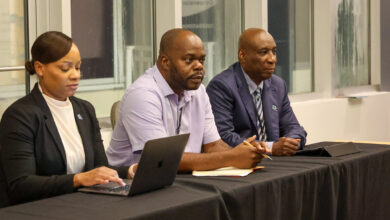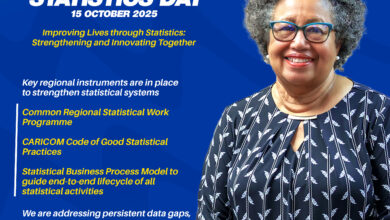(CARICOM Secretariat, Turkeyen, Greater Georgetown, Guyana) The Intergovernmental Panel on Climate Change (IPCC) was established by the World Meteorological Organization (WMO) and United Nations Environment Programme (UNEP) to improve the understanding of climate change, its potential impacts and options for adaptation and mitigation.
Drawing together all the major research from around the world, the IPCC has released three Assessment reports which have formed the basis of our understanding of the climate change problem to date. This year the IPCC, through its usual practice of reviewing all of the scientific developments in the climate change arena since the publication of the last report, is in the process of releasing the Fourth Assessment Report: Climate Change 2007.
The Fourth Assessment Report (FAR) is a synthesis of assessments of three Working Groups. The reports by the three Working Groups provide a comprehensive and up-to-date assessment by many hundreds of climate scientists worldwide of the current state of knowledge on climate change.
Working Group I reports on the Physical Science Basis of Climate Change. This report addresses the key areas of climate change research and shows that the warming of the climate system is unequivocal. This report was published on February 2007.
Working Group II examines the future likely impacts of climate change on the planet, its vulnerability and capacity to adapt. This report was published on April 9th 2007.
Working Group 111 examines issues related to mitigation of climate change i.e issues dealing with the reduction of Green House Gas concentration in the atmosphere and is expected to be published in May 2007.
The final synthesis Fourth Assessment Report is expected to be completed and made public in November 2007.
WG 11 report and the Caribbean
Climate Change was identified as a major environmental issue for the Caribbean and accorded the highest priority in the Barbados Programme Of Action (BPOA) articulated at the SIDS meeting held in Barbados in 1994. Since 1997, the Region has been investing in exercises aimed at building regional capacity better understand how climate change will affect our future, our vulnerability to climate change impacts and what steps we need to take to cope with the projected impacts.
The Region has been supported by the GEF in implementing the Caribbean Planning for Adaptation to Climate Change (CPACC) project (1997-2001), the Mainstreaming of Adaptation to Climate Change (MACC) project (2003-2008) and recently the Special Project on Adaptation to Climate Change ( 2006-2010). Support was also provided by CIDA for the Adaptation to Climate Change in the Caribbean ((ACCC) project (2001-2004). All these projects are aimed at providing the Region with a rational basis for designing responses that will mitigate the impacts of climate variability and climate change on its natural, built and human systems.
In the process of building this capacity, Caribbean Heads agreed to the establishment of the regional Caribbean Community Climate Change Centre (CCCCC) which became fully functional in 2004 and is being hosted by the Government of Belize. The Centre is an autonomous CARICOM organ responsible for giving leadership to and coordinating the regional climate change effort. With the publication of the WG 11 report the Centre in collaboration with the CARICOM Secretariat is taking the opportunity to highlight the report with particular emphasis on it’s implications for the CARICOM region.
This news conference is intended to raise awareness throughout the Region on the threats and opportunities which the climate change problematique poses for the Region’s future and the aspirations of it’s people.
The content of the report is wide-ranging, outlining predicted impacts for all continents and identifying major systems with specific detail. The report was published on April 9, 2007.
The report contains an assessment of climate change impacts on the Small Island and low lying coastal states of the Caribbean.
Several Caribbean scientists were involved in the synthesis of the Working Group 11 report. Dr Leonard Nurse from the Cave Hill Campus was the Lead Author for the Chapter dealing with SIDS, with Dr John Agard from the St Augustine campus. Review editors were Dr Gilian Cambers from the University of Mayaguez and Dr Ulric Trotz from the Caribbean Community Climate Change Centre.
The summary report examines the current scientific understanding of impacts of climate change on the Earth’s systems, their vulnerability and capacity to adapt. It outlines that all continents are being affected by climate change, and that over the last three decades human activity has had a visible impact on many of the planet’s systems. The content of the report is wide-ranging, laying out predicted impacts for all continents and identifying six major systems with specific detail:
- Fresh water resources and their management
- Food, fibre and forest products
- Ecosystems
- Coastal areas and low-lying areas
- Health
- Industry , settlement and society





